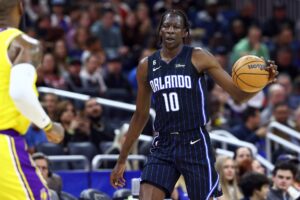The restrictions placed on teams above the second tax apron in the NBA’s new Collective Bargaining Agreement didn’t dissuade the Suns from further increasing their payroll in both the short and long term by acquiring Bradley Beal and his four-year, maximum-salary contract. However, the effects of the new CBA were felt by several of the league’s other top spenders, as ESPN’s Bobby Marks, Kevin Pelton, and Tim Bontemps outline in an Insider-only story.
Bontemps points out that the Clippers‘ decision to waive Eric Gordon before his 2023/24 cap hit became guaranteed saved the club $100MM+ in salary and tax penalties. Gordon ended up signing with the rival Suns, which wasn’t an ideal outcome for L.A.
The Celtics, meanwhile, were in position to keep Grant Williams at a fairly reasonable rate, but opted to sign-and-trade him to Dallas rather than bring him back on a four-year deal worth around $14MM per year.
The Warriors reduced their future financial commitments by trading Jordan Poole and his lucrative new four-year extension in a deal for Chris Paul, who is on a pseudo-expiring contract (his 2024/25 salary is non-guaranteed).
As Bontemps writes, forcing high-payroll teams to make difficult decisions on role players was exactly what the NBA intended when it introduced a more punitive second tax apron in the new CBA. Even the Suns, Bontemps notes, were impacted a little by those new rules, given that they opted to fill out their roster with minimum-salary players rather than using their Early Bird rights to re-sign some of their own free agents, like Torrey Craig and Jock Landale.
Here are a few more ways the new Collective Bargaining Agreement has influenced roster moves around the league this summer, per ESPN’s trio:
- The new CBA requires teams to spend at least to the minimum salary floor (90% of the cap) before the regular season begins — if they don’t, they’ll forfeit a portion of their share of the end-of-season luxury tax payments (50% in 2023/24; the entire amount in future seasons). As a result, all eight teams that operated under the cap in July have already reached the minimum floor, as Bontemps and Marks observe. Free agents across the board didn’t necessarily reap the benefits of that change, since several teams used their cap room in other ways (trades, renegotiations, etc.), but Bruce Brown was one beneficiary, Pelton writes. The Pacers were able to get Brown on a short-term contract (two years with a second-year team option) by making him their highest-paid player ($22MM) for 2023/24.
- The new second-round pick exception looks like a win for both teams and players. According to Marks, this year’s second-round picks have received a total of $47.1MM in guaranteed money so far, up from $36.4MM in 2022. And because the second-round exception requires a team option in either the third or fourth year, there’s no longer a risk for teams of losing a second-rounder to unrestricted free agency (the way the Mavericks lost Jalen Brunson).
- The Kings and Thunder took advantage of the fact that the room exception for under-the-cap teams was upgraded to allow for a third year (instead of just two) and a much higher starting salary (it got a 30% bump, separate from its year-to-year increase). In past seasons, Sacramento and Oklahoma City wouldn’t have been able to sign Sasha Vezenkov and Vasilije Micic to three-year contracts worth between $6-8MM per year without using cap room (or the mid-level exception for over-the-cap teams) to do so. This year, they were able to use that cap space in other ways.
- The Cavaliers and Rockets took advantage of more lenient salary-matching rules for non-taxpaying teams to give Max Strus and Dillon Brooks bigger starting salaries than they previously would have been eligible for based on the outgoing salaries involved in those sign-and-trade deals.
- Hawks guard Dejounte Murray and Kings center Domantas Sabonis were the first two players who took advantage of the fact that veterans signing extensions can now receive a first-year raise up to 40% instead of 20%. It’s possible neither player would have agreed to an extension this offseason without that rule tweak. Knicks forward Josh Hart could be the next player to benefit from that change, according to Marks.
 The move had been expected since last weekend, when
The move had been expected since last weekend, when